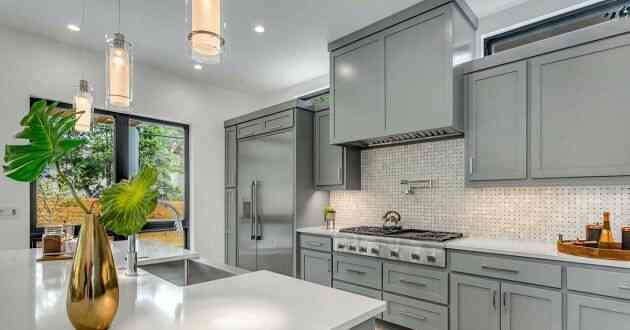Quartzite Vs Quartz Countertops: What’s The Difference?
We’ll tell you about each one to help you pick the right countertop material for your home.
The kitchen is where family and friends gather for good food, conversation and fun. Whether you have a small kitchen refresh or a full-on renovation, the countertop you get is important. So how do you choose? We’ll tell you about each one to help you pick the right countertop material for your home.
Quartzite and Quartz
Quartzite and quartz are popular material choices for kitchen countertops. Despite the similarity in names, they’re two different materials. Many people use the interchangeably but there are qualities that set them apart from one another. They both make excellent choices for kitchen or bathroom countertops.
What is Quartzite?
Quartzite is one of the strongest natural minerals in the world, making it a popular choice for countertops. Mined from deep within the earth and made from sandstone, quartzite is quarried much like granite. It’s a durable stone that’s heat-resistant. The natural veining and striations in quartzite — in dramatic swirls of gray and white — add a touch of elegance and beauty to your kitchen or bathroom countertop.
Pros of Quartzite Countertops:
- It’s exceptionally durable.
- It’s UV resistant.
- It resembles marble.
- Each slab is unique.
Cons of Quartzite Countertops:
- It’s prone to scratches from sharp objects.
- It’s porous, so it is susceptible to staining.
- It’s quite dense, making it difficult to install.
- It’s expensive.
What is Quartz`?
Quartz is an engineered, man-made stone made from ground quartz and resin to keep it together, then baked into slabs. It’s a popular material for countertops, and with good reason. Quartz is non-porous, scratch- and stain-resistant and it’s low-maintenance and easy to clean. Its nonporous surface protects against germs and bacteria. To clean quartz, simply wiped down with a damp cloth. Because pigment can be added to quartz, you can often find it available in an array of colors.
Pros of Quartz Countertops:
- It’s non-porous.
- It’s stain-resistant.
- It has a wider range of designs and colors available.
- It’s low maintenance.
Cons of Quartz Countertops:
- It’s susceptible to heat damage.
- It’s not DIY-friendly.
- It’s made for indoor use only.
- It has more of a manufactured look over natural stone.
Which is Better: Quartz Countertops or Quartzite Countertops
The better option depends on traits that are important to you. They’re both attractive, durable materials, and each has its own characteristic look.
Appearance
Both quartzite and quartz are beautiful, and each slab will have characteristics that appeal to different people. Quartzite is a natural stone with various patterns, coloring and tones that you won’t find in quartz or other manufactured stones. However, quartzite is more prone to staining, etching or scratching than quartz, which can affect its appearance.
Maintenance
When it comes to maintenance, quartz is the winner. It requires little maintenance. To clean, wipe it down with a damp microfiber cloth or use a little dish soap and warm water. Refrain from using harsh, abrasive cleaners and products with a high pH value as these could damage the countertop. Also, when cleaning, try not to scrub too hard as this could cause superficial scratches or dull the surface.
As a natural stone, quartzite requires a little more maintenance than quartz. One of the most frequent questions is about how to clean quartzite countertops. For cleaning, use a little normal dish washing liquid and a damp microfiber cloth. A pH-neutral natural stone cleaner is your best bet for cleaning a quartzite countertop. Stay away from harsh chemicals, citrus-based or bleach-based cleaning products and abrasive cloth. Unlike quartz, quartzite needs to be resealed periodically form maximum protection from staining.
Durability
Both quartzite and quartz are durable, but one of the two is stronger than the other. According to the Mohr’s scale of mineral hardness, quartzite has a hardness score of between 7 and 8 out of 10. Because it’s heat resistant, it can withstand temperatures up to 1,000 degrees Fahrenheit, while quartz’s maximum heat tolerance is around 300 degrees Fahrenheit.
Cost
Quartzite and quartz vary in price with quartzite being the pricier of the two. Mining the quartzite into slabs means a higher price tag. Expect to pay around $65 to $190* per square foot for quartzite, including labor, materials and installation. However, some quartzite like Crystallo and Taj Mahal can cost more. Quartz costs run from about $60 to $150* per square foot. Costs can fluctuate depending on factors like location, the quality of the quartz, thickness, size, color and labor costs.
*These costs can vary across markets, amount of material, etc.
Quartzite countertops or quartz countertops — you can’t go wrong with whichever you choose. They both will enhance the look of your kitchen for many years. To learn more about other countertop materials, our countertop buying guide can help you decide on the right countertop for your home.
Visit Website: https://skstonesusa.com/


